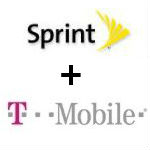 If T-Mobile and Sprint are allowed to merge, rural Americans would see major benefits, the companies argued in a 600-page statement of public interest filed with the FCC yesterday that touts a wide range of merger benefits. Plans would include a T-Mobile Sprint fixed wireless offering that would be competitive with landline options, along with expanded mobile rural coverage and better roaming deals for rural wireless providers, the filing states. The companies also said they “expected” to create 12,000 new jobs in rural areas.
If T-Mobile and Sprint are allowed to merge, rural Americans would see major benefits, the companies argued in a 600-page statement of public interest filed with the FCC yesterday that touts a wide range of merger benefits. Plans would include a T-Mobile Sprint fixed wireless offering that would be competitive with landline options, along with expanded mobile rural coverage and better roaming deals for rural wireless providers, the filing states. The companies also said they “expected” to create 12,000 new jobs in rural areas.
T-Mobile Sprint Fixed Wireless
The T-Mobile Sprint fixed wireless offering would support service of at least 25 Mbps downstream and 3 Mbps upstream to 52.2 million rural residents over 2.4 million square miles or approximately 84.2% of rural residents, according to the filing.
The merged company, referred to in the filing as the “New T-Mobile,” expects to gain an approximate 7% market share, or 9.5 million subscribers, in the in-home broadband market, with 20% to 25% of subscribers located in rural areas. If achieved, this would make New T-Mobile the fourth largest home ISP in the country, the filing states.
According to the filing, “[t]his would not be possible without the merger as neither T-Mobile nor Sprint on its own has the spectrum assets, scale or other resources necessary to deploy networks with the capabilities required to support the quality of streaming HD and 4K video and other key applications in-home broadband customers will demand.”
The filing does not detail the technology that would be used to support fixed wireless service, but fixed wireless equipment using LTE or 5G technology will be available.
The companies expect to price the in-home offering “aggressively,” according to the filing. The filing also argues that other service providers are likely to respond by lowering their prices. “Accordingly, all consumers of in-home broadband service are likely to enjoy cost savings as a result of New T-Mobile’s entry into this business.”
Mobile Rural Wireless
On the mobile side, T-Mobile and Sprint pledge to increase outdoor wireless coverage to reach 59.4 million rural residents or 95.8% of the estimated 62 million rural residents. Just over 30 million rural residents would see indoor mobile wireless coverage. Mobile broadband service would provide download speeds of at least 10 Mbps to 45.9 million rural residents over two million square miles, accounting for 74% of rural residents.
New T-Mobile also will offer to become the “Preferred Roaming Partner” for rural carriers, providing long-term roaming access to its network at “industry-leading terms.” Carriers with existing roaming rates with either T-Mobile or Sprint would be able “to determine which rates will govern their relationship with New T-Mobile after the transaction closes.” The merged company also pledged to provide rural carriers with technical assistance and advice on 5G deployments.
Yesterday’s filing also noted that the merged company would open at least 600 new stores to serve small towns and rural communities, directly resulting in approximately 5,000 new retail jobs. The merged company also would likely create 1,800 new jobs dedicated to “transitioning the T-Mobile and Sprint networks in rural areas and expanding rural coverage.”
New T-Mobile also “expects to” expand its domestic customer care workforce by opening as many as five new customer experience centers in small towns and rural communities that would employ approximately 5,600 people with “career-boosting jobs.” Employees would gain management preparation experience and would qualify for college tuition reimbursement.
In total, New T-Mobile anticipates creating more than 12,000 new jobs to serve small towns and rural communities, the filing states.
T-Mobile and Sprint have discussed a potential merger several times in the past, but this time around the companies really seem to be serious.

